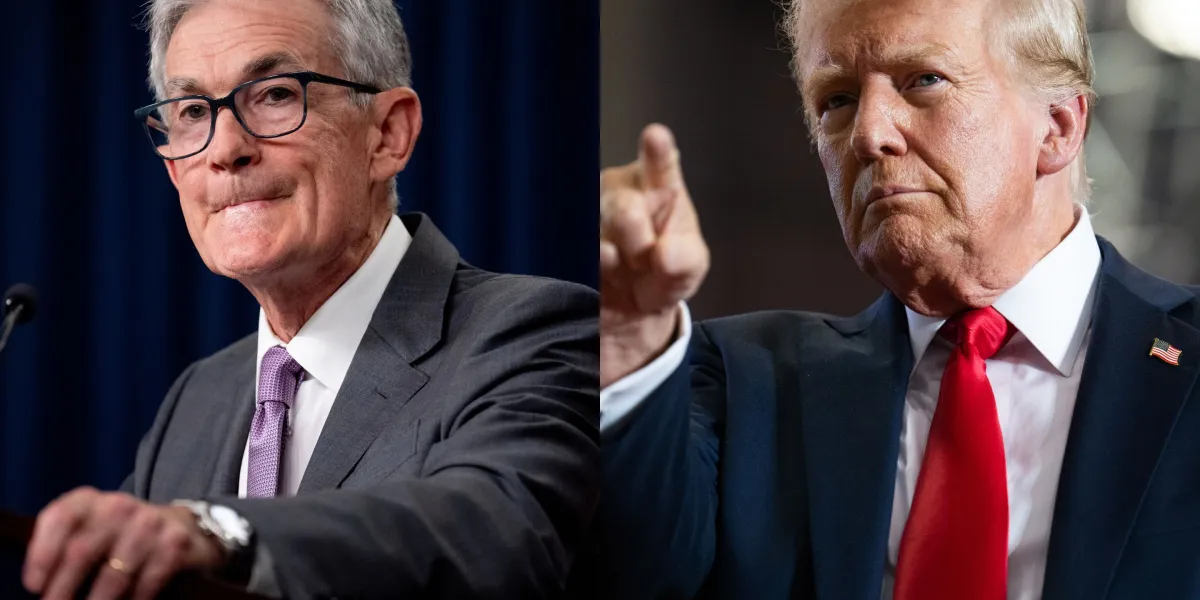Trump tried to sway the Fed and now Powell is fighting back
Presidential hopeful Donald Trump has been dropping not-so-subtle hints about when he wants the Fed to begin cutting rates—but chairman Jerome Powell isn’t interested.
This week the Federal Open Market Committee (FOMC) met to discuss whether the base rate—currently at a more than two-decade high—should be lowered.
While the economy is still warm enough to cause concern that making money cheaper by dropping the base rate would lead to inflation, some members of the Fed have begun teasing a cut following their next meeting in September.
A reduction in the targeted 5.25% to 5.5% base rate would ease pressure on consumers, who might then view the Biden administration’s handling of the economy more favorably as a result.
This is precisely the opposite of what Trump wants to happen.
The Republican candidate told Bloomberg a base rate reduction ahead of the November election is “something that [the Fed] know they shouldn’t be doing.”
‘We don’t want to be involved in politics in any way’
The Fed is supposed to be a nonpartisan, politically independent entity. Powell was keen to drive this detail home in a speech following the conclusion of the FOMC meeting yesterday. Responding directly to a question about Trump’s criticism of a pre-election cut, Powell said he “absolutely” believes any decision the Fed makes will be apolitical.
“First of all, we haven’t made any decisions,” he began. “I don’t know what the data will reveal or how that will affect the appropriate path of our policy.”
“I do know how we will make that assessment … so if you take a step back, the current situation is inflation has come down much closer to our goal, and that’s happened while unemployment has remained low. We’re very tightly focused on using our tools to try to foster that state of affairs continuing.”
“Each of our meetings and all of our decisions are focussed strictly on that and really on nothing else.”
All of that would sound reasonable and anodyne, if it had come from anyone else. But for a Fed chairman — who knows even the slightest misstep when speaking will move global markets — those are fighting words.
His response came after years of Trump’s continual attempts to embroil both Powell and the Fed in political dialogue.
Back in February the former president told Fox Business Network that Powell is “going to do something to probably help the Democrats, I think, if he lowers interest rates”. He continued that Powell was “political”, adding: “It looks to me like he’s trying to lower interest rates for the sake of maybe getting people elected, I don’t know.”
In his press conference Wednesday Powell resoundingly rejected this idea. “We’re a non-political agency,” he said. “We don’t want to be involved in politics in any way.”
Powell’s job is on the line
Powell was nominated by Trump when the latter was president in 2017. He was then re-recommended for the chairman role by President Biden in 2021. Since then, Trump has questioned his job security.
The Republican nominee said in February he wouldn’t reappoint Powell if he won the election, though walked back this stance in last month’s Bloomberg interview.
“I would let [Powell] serve it out,” Trump said, “especially if I thought he was doing the right thing.”
That said, it hasn’t stopped Trump from suggesting who he would hire to replace Powell. His list of—potentially unwilling—candidates include JPMorgan CEO Jamie Dimon, who has repeatedly said he has no interest in such a role.
Powell has said he has no plans to leave the chairman’s office before his term is up, but likewise was unswayed by how the Fed’s decision will land with politicians.
“Congress has, we believe, ordered us to conduct our business in a non-political way at all times—not just some of the time,” Powell said Wednesday. “We never use our tools to support or oppose a political party, a politician or any political outcome.”
“The bottom line is if we do our very best to do our part and we stick to our part, that will benefit all Americans. If we get it right, the economy will be stronger, we’ll have price stability, people will find jobs, wages will rise in real terms—everyone will benefit.”
The former undersecretary of the treasury under Republican President George H.W. Bush, Powell pointed out he had worked with the Fed throughout four presidential elections, having first joined the organization in 2012.
“That’s how we will always act … this is how we think about it, this is what we do,” he said. “Anything that we do before, during or after the election will be based on the data, the outlook and the balance of risks—and not on anything else.”
Powell added that while the Fed is abreast of the comment and insight from scholars and analysts, “we don’t change anything in our approach to address other factors like the political calendar.”
The Fed is indeed facing mounting pressure from doves and hawks alike on when to cut. Some, such as Bill Dudley, the former president of the Federal Reserve Bank of New York, said ahead of the FOMC July meeting that the Fed needs to cut rates as soon as possible.
Other analysts, such as those at Bank of America, are holding out for a cut as late as December. In a note published yesterday seen by Fortune, U.S. economist Michael Gapen, rates strategist Mark Cabana and FX strategist Alex Cohen wrote: “We still forecast the first rate cut in December since we think downside risks to the economy are overstated.”
Kamala Harris may have little allegiance
Despite his most-recent nomination coming from the Democratic Party, Powell may also get a lukewarm reception if Kamala Harris is elected to the Oval Office.
Harris voted against Powell’s confirmation as Federal Reserve chair in 2018 when she was in the Senate, siding instead with a bloc of progressive lawmakers.
Though Powell was reappointed while Harris served as Vice President, political commentators believe there is a “very low probability” that once his term is up in 2026 he will earn another nomination from either candidate.
On the question of Trump vs Harris—and their different economic approaches—Powell said their policies won’t impact forecasts.
“We absolutely do not do that,” he said. “We don’t know who’s going to win, we don’t know what they’re going to do … we just can’t do that.”
While the Fed could run simulations of economic policies proposed by either Republicans or Democrats, he reiterated: “We would never try to make policy decisions based on the outcome of an election that hasn’t happened yet—that is a line we would never cross.”



